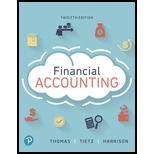
Financial Accounting (12th Edition) (What's New in Accounting)
12th Edition
ISBN: 9780134725987
Author: C. William Thomas, Wendy M. Tietz, Walter T. Harrison Jr.
Publisher: PEARSON
expand_more
expand_more
format_list_bulleted
Question
Chapter 8, Problem 8.1EC
To determine
To identify: The ethical principle which is violated by the member of AICPA.
Expert Solution & Answer
Want to see the full answer?
Check out a sample textbook solution
Students have asked these similar questions
It was reporting a net profit margin on its sales
Please give me correct answer this financial accounting
Westpoint Supplies has net working capital of $4,800, total assets of $29,400, and net fixed assets of $18,500. What is the value of the current liabilities?
Chapter 8 Solutions
Financial Accounting (12th Edition) (What's New in Accounting)
Ch. 8 - All of the following are reported as current...Ch. 8 - Prob. 2QCCh. 8 - Prob. 3QCCh. 8 - What is accounts payable turnover? a.Purchases on...Ch. 8 - Prob. 5QCCh. 8 - Nicholas Corporation accrues the interest expense...Ch. 8 - Phoebe Corporation signed a six-month note payable...Ch. 8 - Prob. 8QCCh. 8 - Backpack Co. was organized to sell a single...Ch. 8 - Prob. 10QC
Ch. 8 - Potential liabilities that depend on future events...Ch. 8 - A contingent liability should be recorded in the...Ch. 8 - Prob. 8.1ECCh. 8 - Prob. 8.1SCh. 8 - Prob. 8.2SCh. 8 - Prob. 8.3SCh. 8 - Prob. 8.4SCh. 8 - (Learning Objective 3: Account for a short-term...Ch. 8 - Prob. 8.6SCh. 8 - (Learning Objective 4: Report warranties in the...Ch. 8 - (Learning Objective 4: Account for accrued...Ch. 8 - (Learning Objective 5: Interpret a companys...Ch. 8 - Prob. 8.10AECh. 8 - Prob. 8.11AECh. 8 - LO 3 (Learning Objective 3: Purchase inventory,...Ch. 8 - (Learning Objective 3: Record note payable...Ch. 8 - (Learning Objective 3: Account for a short-term...Ch. 8 - Prob. 8.15AECh. 8 - Prob. 8.16AECh. 8 - Prob. 8.17AECh. 8 - Prob. 8.18AECh. 8 - Prob. 8.19AECh. 8 - Prob. 8.20BECh. 8 - Prob. 8.21BECh. 8 - LO 3 (Learning Objective 3: Purchase inventory,...Ch. 8 - Prob. 8.23BECh. 8 - Prob. 8.24BECh. 8 - Prob. 8.25BECh. 8 - Prob. 8.26BECh. 8 - Prob. 8.27BECh. 8 - (Learning Objectives 1, 2, 3, 4: Report current...Ch. 8 - Prob. 8.29BECh. 8 - Prob. 8.30QCh. 8 - For the purpose of classifying liabilities as...Ch. 8 - Prob. 8.32QCh. 8 - Prob. 8.33QCh. 8 - Prob. 8.34QCh. 8 - Prob. 8.35QCh. 8 - Prob. 8.36QCh. 8 - Prob. 8.37QCh. 8 - Prob. 8.38QCh. 8 - Prob. 8.39QCh. 8 - Prob. 8.40QCh. 8 - Prob. 8.41QCh. 8 - Prob. 8.42QCh. 8 - Prob. 8.43QCh. 8 - Group A LO 1, 2, 3, 4 (Learning Objective 1, 2, 3,...Ch. 8 - Prob. 8.45APCh. 8 - LO 1, 2, 3, 4 (Learning Objectives 1, 2, 3, 4:...Ch. 8 - LO 4, 5 (Learning Objectives 4, 5: Account for...Ch. 8 - Group B LO 1, 2, 3, 4 (Learning Objectives 1, 2,...Ch. 8 - Prob. 8.49BPCh. 8 - Prob. 8.50BPCh. 8 - Prob. 8.51BPCh. 8 - Prob. 8.52CEPCh. 8 - Prob. 8.53SCCh. 8 - Prob. 8.54DCCh. 8 - Prob. 8.55DCCh. 8 - Prob. 8.56EICCh. 8 - Prob. 1FFCh. 8 - Prob. 1GP
Knowledge Booster
Similar questions
arrow_back_ios
SEE MORE QUESTIONS
arrow_forward_ios
Recommended textbooks for you
 Auditing: A Risk Based-Approach to Conducting a Q...AccountingISBN:9781305080577Author:Karla M Johnstone, Audrey A. Gramling, Larry E. RittenbergPublisher:South-Western College Pub
Auditing: A Risk Based-Approach to Conducting a Q...AccountingISBN:9781305080577Author:Karla M Johnstone, Audrey A. Gramling, Larry E. RittenbergPublisher:South-Western College Pub Auditing: A Risk Based-Approach (MindTap Course L...AccountingISBN:9781337619455Author:Karla M Johnstone, Audrey A. Gramling, Larry E. RittenbergPublisher:Cengage Learning
Auditing: A Risk Based-Approach (MindTap Course L...AccountingISBN:9781337619455Author:Karla M Johnstone, Audrey A. Gramling, Larry E. RittenbergPublisher:Cengage Learning- Principles of Accounting Volume 1AccountingISBN:9781947172685Author:OpenStaxPublisher:OpenStax CollegeBusiness Its Legal Ethical & Global EnvironmentAccountingISBN:9781305224414Author:JENNINGSPublisher:Cengage


Auditing: A Risk Based-Approach to Conducting a Q...
Accounting
ISBN:9781305080577
Author:Karla M Johnstone, Audrey A. Gramling, Larry E. Rittenberg
Publisher:South-Western College Pub

Auditing: A Risk Based-Approach (MindTap Course L...
Accounting
ISBN:9781337619455
Author:Karla M Johnstone, Audrey A. Gramling, Larry E. Rittenberg
Publisher:Cengage Learning

Principles of Accounting Volume 1
Accounting
ISBN:9781947172685
Author:OpenStax
Publisher:OpenStax College

Business Its Legal Ethical & Global Environment
Accounting
ISBN:9781305224414
Author:JENNINGS
Publisher:Cengage